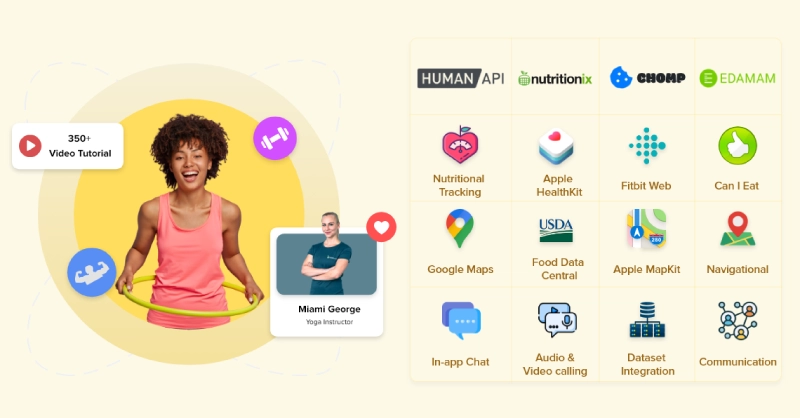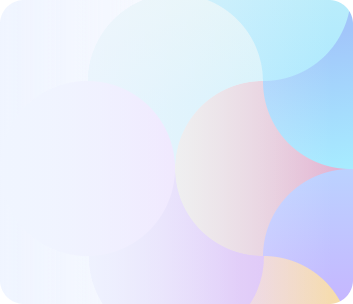14 Fitness APIs & Wellness APIs To Enhance Your App in 2025

Fitness and wellness apps have become life saviors to many health-conscious people around. These apps help users to track their calorie intake, find the best running routes, keep a count of their jogging and cycling activity, track heart rate,& more fitness APIs Hence, this growing popularity has led developers to use fitness APIs or gym exercises APIs for building fitness apps for Android, iOS, and web in a matter of minutes.
A recent report shows that the downloads of fitness apps drastically increased by 50% in the year 2020 alone. Well, one of the reasons for the spike was because of the pandemic that left many in-person gyms and fitness studios closed.
Table of Contents
What is a Fitness API?
A Fitness API is a set of programming tools that work in collaboration with several fitness devices, allowing developers to collect fitness-related data from users and save it in a database.
Developers use these for fitness app development to provide detailed insight on health status, calorie intake, location data, micronutrient count, and health tips to help fitness freaks achieve their goals. Now to the first category of fitness app.
In this article, we will discuss the best 14 fitness APIs.
Navigational APIs
Navigational APIs allow developers to interact with online maps and location services, and embed real-time mapping capabilities into fitness applications (including Chat API). However, these fitness and exercise APIs are most importantly used to track activities like running, walking, cycling, and where to head.
Google maps and Apple Maps support these GPS-focused APIs in geolocation-based functionalities.
1. Apple MapKit APIs
Apple MapKit APIs enable you to add the map functionality to your website and mobile apps and are well supported by Apple devices like watches and iPhones. They include certain capabilities like overlays, annotations, and interfaces to services like search and directions. And identify tourist attractions such as cafes, museums, historical markers, and running or cycling routes.
Major Industries served: Navigation, transportation, logistics, and location-based services.

- Complete Source Code
- Lifetime Data Ownership
- Deploy on Own Server
2. Google Maps APIs
It is the most popular mapping APIs, with over 25 million updates per day. The Google Maps is a collection of fitness tracker APIs and SDKs that helps you integrate Maps into apps. It is further divided into three categories: Maps, Places, and Routes. Each of them exists to fulfill the specific needs of your business.
Major Industries served: Navigation, transportation, logistics, real estate, retail, and location-based services.
3. Nutritionix Restaurant Geolocation API
Nutritionix Restaurant Geolocation API allows restaurant owners and operators to gather important data about their locations, including reviews, ratings, menu items sold, etc so that users can know the list of restaurants en-route and dine in when needed. Further, this information is then used with other analytics tools such as CRM systems or marketing initiatives thus helping riders or travelers to eat healthier on the road. This type of fitness API works as when the user enters their zip code, and the app searches its database of over 206K restaurant locations for results.
Major Industries served: Food and nutrition, health and wellness, and restaurant and hospitality.
4. Mapbox API
This type of rich fitness API and SDK helps developers to build a highly intuitive fitness app development with top-notch maps and navigation thereby aiding riders to find the best cycling, walking, and running routes using GPS.
Besides these, the prime benefit of Mapbox API for fitness is that users may still be able to access offline maps in remote locations where there is no network connectivity.
Major Industries served: Navigation, transportation, logistics, real estate, retail, and location-based services.
Nutritional Tracking APIs
These APIs provide macronutrient data on hundreds of thousands of foods and products thus making it easier for developers to incorporate food-tracking capabilities into their apps.
5. Can I Eat API
Can I Eat API displays information on the nutritional content of meals and over 80k+ food products that will help vegans and vegetarians to intake their food accordingly. And users can search for the desired food product using the name and barcode in their fitness apps that will yield results.
Major Industries served: Food and nutrition, health and wellness, and dietary management.
Did you know that Martin Isark and his review team even contributed tasting notes?
6. Chomp Food & Nutrition Database API
This workout API can retrieve high-quality data on over 535,000 food products quickly and efficiently that includes nutrition labels, ingredients, diet compatibility, barcodes, and other useful information. Further, if users need to obtain detailed information on some food product then they must enter a barcode or product name and get details.
Major Industries served: Food and nutrition, health and wellness, and dietary management.
Did you know that this workout API can calculate the nutritional value of packaged foods too?
7. Edamam Nutrition Analysis API
This API makes use of Natural Language Processing and semantically structured data. It performs real-time entity extraction, and applicable health and diet labels. It also includes recipe classification for a meal and dish types of food recipes. It enables you to find nutrition facts for a specific food, such as macro and micronutrients, allergen labels, and more.
Major Industries served: Food and nutrition, health and wellness, and dietary management.
8. Food Data Central API
This API gives RESTful access to FoodData Central. It is mainly used by developers who want to integrate nutrient data into their apps or websites. They do not include Video calling API and Audio calling API. There are two endpoints. The first is Food Search, which returns foods that match the search criteria. The next is Food Details, which returns details on a specific food.
Major Industries served: Food and nutrition, health and wellness, and dietary management.
Dataset Integration APIs
These APIs offer seamless connectivity that enables companies to automate business processes. They also improve data sharing and embedding across multiple applications and systems.
9. Apple Healthkit API
This API allows health and fitness apps to exchange data with the iOS 8+ Health app. They include the Video chat API and Audio calling API to create interaction within the apps.
HealthKit acts as a central hub for all the health and fitness apps on iOS devices. It gives consumers more control over their fitness levels & workout plans while maintaining their privacy. This API provides guided meditation and strength training services.
Major Industries served: Healthcare, fitness, and wellness.
10. Fitbit Web API
Fitbit provides wearable devices and data services to help people live healthier lifestyles. This API allows third-party workout apps to access and write activity data on users’ training plans. When you use a Fitbit device, data is collected for tracking your progress with step count, distance traveled and calories burnt. It also calculates weight, heart rate, sleep stages, and location.
Major Industries served: Fitness, wellness, and healthcare.
11. Human API
Human API enables simple authentication of users’ health data from anywhere in the data source network. When you enable authentication into your web or mobile apps, the users need to grant data access. It intends to collect health data from all sources and make it available to insurance, life sciences, and digital health companies
Major Industries served: Healthcare, fitness, and wellness.
12. Garmin Health API
Garmin Health API is a scalable and REST API that is used to integrate health data like heart rate respiration rate, pulse-ox, stress levels, biometric data, and body composition values to fitness and workout apps. Additionally, this is inclusive of a Women’s Health API that comes of great help to women to access information related to menstrual cycles. Great is it not?
Major Industries served: Fitness, wellness, and healthcare.
Communication APIs
This instant messaging API serves the purpose of seamless, structured and standardized internal and external communications in an organization.
13. In-app Chat API
Fitness in-app chat API allows developers to create chat features within their app. It enables users to communicate with one another within the app. It includes features such as sending and receiving messages, joining or leaving chats, and managing contacts. However, it still lacks the features of In-app video calling API.
Major Industries served: Communication, social media, and messaging.
14. In-app Audio & Video Calling API
Both the APIs allow developers to include audio and video calls in their apps. It can be used for things like group discussions or communicating with customers via live chat functionality. In-app audio calling API is used to enable the automatic transcoding of phone calls into text format. It enables developers to create custom video chats along with screen sharing and moderation controls.
The communication APIs can also be used for other purposes, such as customer support or sales activity. In-app video calling API allows for faster communication at any network condition to give users an immersive video experience.
Major Industries served: Communication, social media, and messaging.
Conclusion
In conclusion, due to technological progress, most people now have access to a wide range of fitness apps. They make it simple to work up a sweat, build strength, and stay motivated anywhere and at any time.
We hope that our list of the 14 best fitness APIs gave the clarity you need on the subject matter. Further, we recommend you explore our best free chat APIs that might match your fitness app requirements. Besides, if you’d like to build your fitness chat apps with our customizable video, voice and chat features, check out our self-hosted chat solution today!
Meanwhile, you may let us know the topics you wish to learn about in the comment section below. Until then, we bid our bye wishing you the best!
Get Started with MirrorFly’s Scalable Chat Features Today!
Drive 1+ billions of conversations on your apps with highly secure 250+ real-time Communication Features.
Contact Sales200+ Happy Clients
Topic-based Chat
Multi-tenancy Support

Frequently Asked Questions (FAQ)
Yes. MirrorFly is one of the leading in-app chat API providers that offers lifetime free chat APIs for developers “in-app chat API providers that offers lifetime free chat APIs for developers to add modern messaging features like push notifications, single and group chats, online presence indicators, and delivery receipts to Android, iOS, and web chat apps.
The cost to create a fitness app depends on several factors like features, UI/UX design, DevOps services, team location, and timeline of the project. Therefore, considering these parameters, you may expect the market price of creating a fitness app to be between $90,000 to $150,000.
MirrorFly’s chat SDK is exceptionally compatible across web, Android and iOS platforms, as well as on browsers like Firefox, Safari, and Chrome. Additionally, our chat APIs are highly adaptable to any kind of programming languages such as React JS, Angular, Flutter, Kotlin, Swift, and Vue Js thus making mobile and web chat app development easily and effective.
Yes. Using MirrorFly’s chat SDK, developers can quickly add real-time messaging capabilities to communication apps in less than 30 minutes without the need to spend a fortune on resources or time.
A fitness API (Workout API or Health API) is a software interface that allows developers to access and interact with data related to physical activities, health, and wellness. These APIs enable the integration of fitness and health-related features into various applications, platforms, and devices.
You can use Apple’s MapKit for free when building your apps for iPhone, Mac, Apple Watch, and Apple TV. This means you can add maps and location features to your apps without having to pay extra money just for using MapKit.
The Nutritionix database is the world’s largest online resource containing detailed nutritional facts about all sorts of foods. It offers information on things like carbohydrates, proteins, fats, vitamins, minerals, calories, and serving sizes. People, as well as nutritionists, health experts, and fitness apps, use this database to keep tabs on their diets and nutrition objectives.
The key differences between Google Maps and Mapbox are: 1. Google Maps uses its own data whereas Mapbox uses data from various sources. 2. Mapbox allows more creative map styles and Google Maps has some limits on customization. 3. Google Maps offers free usage up to limits but Mapbox has pay-as-you-go and custom pricing. 4. Mapbox has powerful tools and vector maps but Google Maps offers various services but with less customization.
Your article helped me a lot, is there any more related content? Thanks!
Hello, Great article! I’m planning to build the best online chat app for fitness. I’d like to include chat features so that users can directly chat with their fitness instructors and nutritionists. Are communication APIs right for me?
Hello Hefin!
Glad to know that you are looking to connect your users on your fitness app. Yes, communication APIs including in-app chat and in-app audio and video calling solution will work best for you. In fact, MirrorFly offers the best FREE chat app that you can easily integrate into your fitness app and thereby include over 150+ features within 30 minutes. Go ahead, get lifetime access to the chat SDK now!
I’m creating a Fitness App Project to improve my knowledge of Flutter Development. I have been able to properly do most things except implementing chat features. Is there a pre-built API that I can add to my app?
Hello Khalil,
It’s great to know that you are building a fitness app in Flutter. Yes, you can easily add a pre-built and completely Free messaging app to your app without having to spend months writing codes for including messaging features. Hope this helps. Happy developing!
Thanks for the article! I’m looking for the best APIs for fitness software for my android and ios app and you gave a good one to take a look at.
Hi Pushpa, you’re most welcome! Thanks for your positive feedback on my article and I’m really glad that you found my post to be informative and useful for your Android and iOS app.
Hi, Currently I’m on a project to build a fitness app that will have the ability to make chat & audio/video calls, can you provide me your price? Please reply back to me with some more info. Thanks
Hello Sahul, thanks for your interest in MirrorFly’s video, voice + chat service for your fitness app project. Really exciting to hear about your new app development and our best wishes for it. When it comes to pricing, you can avail our SDKs for either monthly subscriptions or one-time license cost based on the needs of your It project. Likewise, the deployment options too may vary based on the pricing model.
If you want to learn more about our features and pricing info, please visit our pricing page.
Thanks for sharing such great information. I read and manage blogs, the blog site is very interesting and effective. Keep posting.
Thanks Joel, for such a wonderful response to my article. I’m really glad that you found my blog to be useful and interesting. Sure, will keep posting more engaging blog posts in the future, so stay glued to our blog site. My best wishes to you!